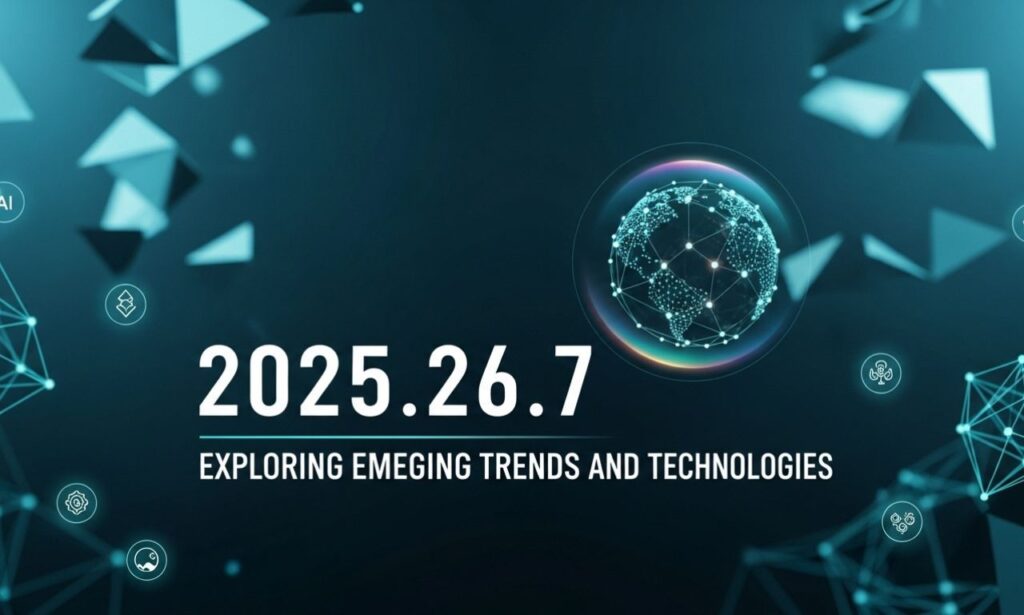The world is changing at an unprecedented pace, and as we venture further into the future, emerging trends and technologies are set to redefine our daily lives. The year 2025.26.7 promises a transformative landscape where innovation meets necessity. With buzzwords like AI, VR/AR, blockchain, and automation dominating discussions, it’s essential to understand what lies ahead.
As we delve into the concept of 2025.26.7, we’ll explore how these advancements will shape various sectors and alter human experiences in ways we’ve only begun to imagine. Whether you’re a tech enthusiast or just curious about the future’s implications on society, this journey through cutting-edge developments invites you to envision tomorrow today.
What is 2025.26.7?
2025.26.7 represents a pivotal moment in the intersection of technology and society. It symbolizes an era where emerging trends redefine our daily interactions and experiences.
This concept encompasses innovations that are set to reshape industries, economies, and lifestyles. Think of it as a roadmap guiding us toward future advancements.
At its core, 2025.26.7 highlights the importance of adaptability in navigating this rapidly changing landscape. Embracing these transformations will be essential for both individuals and organizations alike.
The date itself signifies urgency—an invitation to prepare for the technological shifts on the horizon while fostering creativity and collaboration across various fields.
Understanding 2025.26.7 means recognizing not just what is coming but how we can integrate these technologies into our lives effectively.
The Impact of Artificial Intelligence (AI)
Artificial Intelligence (AI) is revolutionizing industries worldwide. Its ability to analyze vast amounts of data quickly and accurately has transformed decision-making processes.
Businesses are leveraging AI for better customer insights. Chatbots, powered by machine learning, enhance user experience through instant support. This technology personalizes interactions like never before.
In healthcare, AI algorithms assist in diagnostics and treatment plans. They identify patterns that may elude human eyes, improving patient outcomes significantly.
Education also benefits from AI advancements. Personalized learning platforms adapt to individual needs, making education more accessible and effective.
Moreover, creative fields see a surge in AI-generated art and music. These innovations challenge traditional notions of creativity while inspiring new collaborations between humans and machines.
As we embrace the evolution of workspaces with automation, it’s clear that AI’s impact will only grow stronger in shaping our future environments.
Advancements in Virtual and Augmented Reality (VR/AR)
Virtual and Augmented Reality (VR/AR) technologies are transforming how we experience the digital world. They create immersive environments that engage users in ways traditional media cannot.
Recent advancements have made VR headsets lighter and more affordable, making them accessible to a broader audience. Enhanced graphics provide stunning visuals that can transport users into fantastical realms or realistic simulations.
AR is also gaining traction, especially in mobile applications. Imagine overlaying information onto your physical surroundings through your smartphone lens. This capability enhances learning experiences and practical applications alike.
Industries such as education, healthcare, and entertainment are harnessing these technologies for training, therapy, and gaming. The potential seems limitless as creators continue to push boundaries.
As developers innovate further, expect to see even richer interactions between the real world and digital overlays—bringing us closer than ever to a seamless blend of reality and imagination.
The Rise of Blockchain Technology
Blockchain technology is gaining momentum as a transformative force across various sectors. Its decentralized nature ensures greater transparency and security, making it appealing for businesses and consumers alike.
This innovation is not just about cryptocurrencies. Industries such as finance, supply chain management, and healthcare are recognizing blockchain’s potential to streamline processes. By providing an immutable ledger, transactions become more trustworthy and efficient.
Smart contracts are another layer of this technology that eliminates the need for intermediaries. These self-executing contracts automate agreements based on coded conditions, paving the way for faster deal closures.
As organizations increasingly adopt blockchain solutions, we can expect significant shifts in how data is handled. The emphasis on secure digital interactions will likely drive further investment into research and development in this area.
Automation and Robotics in Various Industries
Automation and robotics are revolutionizing industries worldwide. From manufacturing to healthcare, these technologies enhance efficiency and precision.
In factories, robots take on repetitive tasks, reducing human error. This shift allows workers to focus on more complex duties that require critical thinking.
Healthcare is also seeing significant advancements. Surgical robots assist surgeons with delicate procedures, improving outcomes and minimizing recovery times for patients.
Agriculture benefits too. Drones monitor crop health while autonomous vehicles plant seeds or harvest produce. This innovation leads to increased yields and sustainable practices.
Retail isn’t left behind either. Automated checkout systems streamline shopping experiences, saving time for consumers while cutting operational costs for businesses.
As automation continues to evolve, its potential seems limitless across various sectors. Embracing this change will be crucial for companies aiming to thrive in a competitive landscape.
The Future of Data Science and Analytics
Data science and analytics are set to undergo a transformation like never before. As we move deeper into this digital age, the ability to harness big data will define success across industries.
Machine learning algorithms continue to evolve rapidly. This evolution allows for more sophisticated predictive modeling. Businesses can anticipate customer needs with unprecedented accuracy.
Moreover, real-time analytics will gain traction. Organizations will leverage instant insights for quicker decision-making processes. The power to adapt swiftly is becoming essential.
Furthermore, ethical considerations in data usage are emerging as critical discussions. Transparency and accountability will shape how companies engage with their audience’s information.
Collaboration between humans and AI tools is inevitable too. Data scientists will increasingly work alongside intelligent systems, enhancing creativity and efficiency in problem-solving tasks.
The future of data science holds immense promise, pushing boundaries while fostering innovation across sectors.
Embracing the Future
Embracing the future means opening ourselves to possibilities. It’s about adapting and evolving with emerging technologies.
As we navigate through advancements, a willingness to learn becomes essential. New tools and platforms are reshaping industries before our eyes. Staying informed is no longer an option; it’s a necessity.
Collaboration plays a vital role in this journey. Diverse minds working together can spark innovation that drives progress further than any individual effort could achieve alone.
Consider how these trends affect everyday life. Convenience, efficiency, and enhanced experiences await those ready to embrace change head-on.
Cultivating an adaptable mindset will prepare us for the unexpected challenges ahead. The landscape of technology is always shifting, but so are we—becoming more connected and resilient as we move forward into uncharted territory.
Conclusion
As we delve into the landscape shaped by 2025.26.7, it’s clear that emerging trends and technologies are carving out a new era of possibilities. The advancements in AI promise to redefine how we interact with machines and enhance decision-making processes across various sectors. Virtual and augmented reality continue to bridge the gap between digital experiences and our physical world, offering fresh avenues for creativity and engagement.
Blockchain technology stands poised to transform security protocols while fostering trust in transactions across industries. Automation and robotics are not just enhancing productivity; they’re also revolutionizing workplaces, making them more efficient than ever before. Moreover, data science is evolving rapidly, enabling better insights that drive innovative solutions.
Embracing these changes will be essential as we navigate through this period of technological evolution. Adapting to the shifts brought on by 2025.26.7 is not just about keeping up but also about seizing opportunities that can lead us toward a future filled with potential breakthroughs in every aspect of life—the possibilities are truly exciting!






